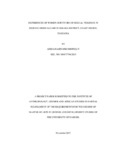| dc.description.abstract | This was an exploratory study of experiences of women survivors of sexual and gender-based violence in seeking medical care in Kibaha District. In this study, a close assessment of lived experiences and challenges in accessing medical care were the main focus. Purposive and snow-ball sampling were used to select 41 informants for in-depth interviews. The informants were from three administrative wards: Mlandizi, Magindu and Kwala wards. Six key informants were purposively drawn to give insight on how the medical management of SGBV survivors is done in the existing support structures as well as the perceived challenges that hinder women from accessing quality medical care. Further, two women were purposively selected to give case narratives based on their lived accounts after experiencing sexual violence and seeking medical care in the existing medical structures. Finally, three focus group discussions with community members as well as representatives of village and ward multi-sectoral committees on violence against children were held to gather community perceptions on SGBV and challenges women survivors encounter while seeking medical care in the district.
The results reveal that sexual violence is perceived as “completed” sexual intercourse that involves force by a stranger or someone known or relate to the victim without consent such as rape and defilement; however “attempted sexual acts” are not regarded as sexual violence in the community.
This study also indicates that sexual violence is prevalent in KDC however, few cases are documented in formal structures including health facilities; majority of adult women do not report sexual abuse particularly perpetrated by intimate partners. Culture plays significant role in perpetuating gender inequalities and fueling sexual and all forms of violence against women and children in Kibaha. These socio-cultural practices contribute both to women’s vulnerability and to their lack of autonomy and agency to respond to threats of violence.
xv
The study observed that various factors act as barriers to access to quality medical care among women survivors of SGBV including; limited understanding on where, how and when to seek help, lack of confidence, long distance to support systems i.e. health facilities and police stations; lack of confidentiality among service providers, Discriminative cultural Norms and social stigma and women’s illiteracy on their basic health rights. Economic dependency and poverty are among the factors that prevent them from seeking medical care, as they would love to due to the high costs of services.
Basing on the above findings, this study recommends for the improvement of healthcare response to SGBV in Kibaha district particularly by ensuring the availability of skilled medical personnel and adequate supplies for caring of survivors of SGBV in both selected health facilities that offer the services and creation of a One Stop Center (OSC). The initiation of multi-sectoral response to sexual and gender-based violence especially those that aim to improve the lives of women and children as well as effective community awareness programs on gender and sexual violence is of paramount importance. Also, there is need for the implementation of the relevant laws and available support services to survivors of sexual and gender based violence. | en_US |



